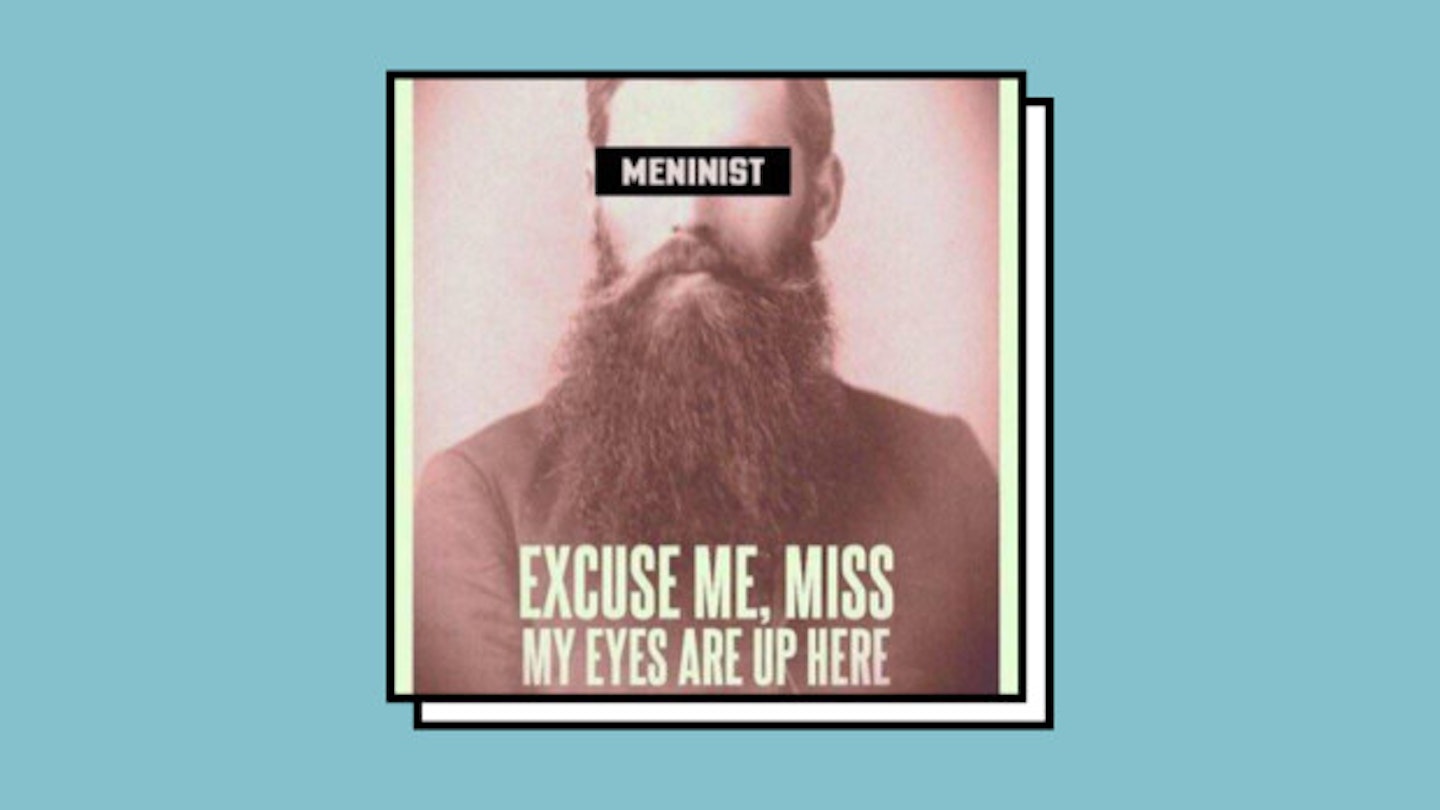It began with good intentions. Feminist.com, which, according to Gloria Steinem, “put the dot-com in feminism", hosted a post outlining the cause of the 'Meninist' movement. Here was a 'global organization of men that believe and support the feminist principles of women’s political, social and economic equality'. It was a worthy, good-hearted if unexciting call for solidarity.
And then on 16 December 2013, some time after the original Feminist.com post, #MENINISTTWITTER began trending . Some of those using the hashtag were clearly taking the piss out of a male version of feminism.
But there was another group emerging, one that had had it up to here with all this talk of the patriarchy. They didn’t like being criticised for objectifying women when women objectified them. They’d been told they were too fat or too short or too nerdy or too unpleasantly sexist and hey, isn’t that just what patriarchal men do? They took the idea of Meninism and ran with it. This wasn’t a new breed of Marxist-Leninist; it was the same old breed of angry, disaffected man, 'standing up' for men by pointing at all the wrong targets.
Today, men (and women) look around them and wonder if this was really what they were promised. Young men whose fathers could buy property, meet women without having to swipe left or right, drink in pubs and find some dignity in work even if it didn’t make them millionaires now come of age and struggle to do those same things while also struggling with the age old issue of what they feel and how they can express without betraying the dangerously unhealthy masculine tropes we continue to internalise: the stiff upper lip, the stoicism.
In response, these young men fall back on the comforts of being a lad. They build a wall of men around them and, when that wall turns into something isolating, they strike out at women they perceive to be infringing on their right to just be a good lad. The terrible sadness of something like the Meninist movement is that it insincerely pits men with genuine frustrations against women who are, in no way, their enemy. Just as UKIP tells its followers that the anger and anxiety they feel is to do with immigrants, the Meninist movement tells its followers that the anger and anxiety they feel is to do with women who want to live in an equal society.
Recently, I sat with my father in his kitchen. We were talking about his childhood - something both he and his brother struggle to talk about openly. As he spoke, I had the feeling that he was standing before a tidal wave that had risen into a wall behind him. If he spoke too openly, if he delved too deep and too honestly, the wave would crash over him and he would be swept away in a sea of pain too fathomless to comprehend. Better then, to not say too much.
The stiff upper lip prided by generations of British men hasn’t gone anywhere. There have always been whole swathes of men in this country who have, largely for economic and social reasons, been cut off from the riches our society claims to be available to all. That problem is more pronounced for my generation than it was for my father’s, which came of age in a time of unprecedented equality and opportunity. At a wedding recently, I had a conversation that read as a carbon copy of the one I had with my father. A friend, talking about why his marriage had failed, could manage barely more than, ‘you know what we’re like, mate, us London lads…’
Then, on 20 January this year, a young man was found guilty of attempting to stab four women to death. A virgin, he told the police that ‘all women need to die' and that he was frustrated with 'fussy' women who wouldn’t sleep with him. 'Come and arrest me for God's sake before I hunt for my fourth victim,' he pleaded and then, when asked why he did it, he added that it was to 'get out of this horrible life with more stress and to save myself and my family, I'm not a bad child and didn't want to do this but have no choice.'

In 2012, Hanna Rosin famously laid down in her book The End of Men: And the Rise of Women, what she perceived to be a crisis in masculinity. The crux of her argument was that the modern world was one women thrived in, one in which traditional male qualities were decreasingly relevant. But when I read Ben Moynihan’s words, I think of a perennial issue for British men: the stiff upper lip. Moynihan, unable to tell anyone what he was feeling or why, struck out in the most violent way imaginable. He knew what he was doing was wrong so he pleaded to be released from the prison of his inexpressible anger.
What the Meninist movement represents is the cynical co-opting of these feelings for financial gain at the expense of social cohesion. The parody Twitter account @MeninistTweet has 617,000 followers and counting. The account is hooked it up to an online store that sells #MENINIST branded clothing and its timeline is full of branded tweets. These guys are making money encouraging unhappy young men to spew hatred at women. The Meninist movement has become a way of making money out of the frustrations. In this way, it’s become like so many other scams. And in this way too, it slides a knife into an already suffering society.
**You might also be interested in: **
Now Elliot Rodger Has Been Called A Hero On Men's Rights Activist Groups
An Open Letter To The Women Who Say They Don't Need Feminism: Here's A Clue, You Do
** Follow Oscar on Twitter @oscarrickettnow**
This article originally appeared on The Debrief.
